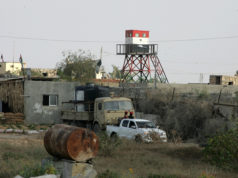Egypt has moved forces into the Sinai beyond what was agreed to in the Egypt-Israel Peace Treaty. Getting them in wasn’t that difficult – Israel agrees that security in the Sinai has deteriorated. Getting them out again later may be another matter. And how the U.S. positions itself to safeguard the treaty itself will be crucial.
One of the lesser-known American military deployments is as part of the Multinational Force & Observers in the Sinai (MFO), inserted in 1981. Its mission is to “supervise the implementation of the security provisions of the Egyptian-Israeli Treaty of Peace and employ best efforts to prevent violations of its terms.” The MFO consists of 1,656 soldiers from 12 nations.1 and, according to its website, operates checkpoints, reconnaissance patrols and observation posts; verifies the continued implementation of various arms limitations in the Sinai; ensures freedom of navigation through the Strait of Tiran; and monitors the deployment of border guards along the Egyptian side of the Gaza/Egypt border to ensure that it meets the terms agreed to by Israel and Egypt in 2005.
The MFO, clearly, is not a fighting force; it is a peacekeeping force with an agreed-upon peace to keep.
So how odd it is that Defense Secretary Leon Panetta has announced that the U.S. “is providing additional military assistance to peacekeeping forces in Egypt’s Sinai Peninsula to strengthen security in the region.”
Panetta said no additional troops had been sent to Sinai, but that the U.S. was working closely with Egyptian leaders “to determine what additional help they may need in order to ensure that the area is secured.”
To change the mission of the MFO from monitoring the Israel-Egypt peace treaty to helping Egypt secure the Sinai from terrorists/jihadists/al Qaeda is a change that cannot be undertaken lightly – and should not be taken unilaterally. To change the force from the touchstone for both Israel and Egypt into an ally of Egypt in military operations will undermine its status in the future.
The MFO does need to secure itself in the face of rising violence and longtime Egypt-watcher David Schenker notes that it has already made adjustments.
The force has upgraded its vehicles in recent years, and many of them are fully or partially armored. Yet growing abduction fears have led to the cancellation of many patrols, and reconnaissance flights have reportedly been scaled back due to concerns about terrorists or other actors fielding man-portable air-defense systems (MANPADS). Should the situation continue to deteriorate, the MFO might reduce its patrols even further.
He adds:
Over time, the MFO’s mission will simply become untenable unless security improves in the Sinai — or unless the rules of engagement are changed, which seems unlikely.
Changing the rules of engagement is much more likely now. Secretary Panetta is not talking about how the force protects itself while it does the job it was designed to do. He is talking about helping Egypt do something forbidden by the Camp David Accords – bring large-scale military forces into Sinai.
The fact is the U.S. and Israel have been somewhere between sanguine and cautiously happy regarding increased Egyptian concern about jihadists in the Sinai, and have accepted an Egyptian buildup that includes aircraft and helicopter gunships. Israel Radio reported Friday that the deployment includes anti-aircraft and anti-tank missiles near the border. Israel’s longer-term concern will be whether at some point Egypt removes the additional forces and returns to the agreed-upon restrictions and demilitarized zones.2 Recent comments by Egyptian government officials suggest they will not.
Former presidential contender Abdel-Moneim Abolfotoh called for President Morsi to reject limitations on Egyptian forces, saying, “The blood that has been spilled should force Egypt to assume full control of Sinai without the restrictions and obligations stipulated by this inequitable treaty that prevents Egypt’s armed forces from deploying on Egyptian territory.”
Mohammed Gadallah, a legal advisor to Morsi, said the Egyptian government is considering “amending” the Camp David Accords “to ensure Egypt’s full sovereignty and control over every inch of Sinai.”
It is hard to imagine a circumstance in which the United States should support the restoration of “full sovereignty and control” of Sinai, including military control, to the Muslim Brotherhood government of Egypt. Israeli analyst Ehud Yaari said if the Egyptians want to go in that direction, “Israel should have its answer ready” and that the mechanism for negotiating change is the MFO.
But if the MFO mission changes by design or by mission creep, it may provide little support for Israel’s position. Secretary Panetta should be extremely careful about the circumstances under which the U.S. will supply “additional help” to increase the long term staying power of the Egyptian military where Israel does not necessarily agree it should be.
1. Australia, Canada, Colombia, the Czech Republic, the Republic of the Fiji Islands, France, Hungary, Italy, New Zealand, Norway, the United States and Uruguay
2. Its second concern will have to be whether such weapons as the Stinger missiles reportedly given to Syrian rebels by the CIA will ultimately find their way to the Sinai via interlocking terrorist organizations.





